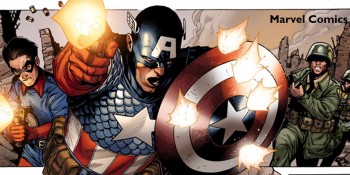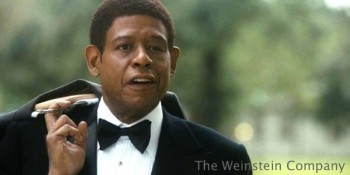Captain America returns to the silver screen Friday, and in honor of this comic book icon, let us take a look back at the character’s history.
It was 1941. World War II was raging in Europe and the Pacific. Men and women were dying to protect their homelands from invading armies. Hitler, Mussolini, and Hirohito were guiding their nations toward new world empires. And the United States was enjoying its status as a neutral nation, content with being the Arsenal of Democracy. Some Americans, however, saw that entry into the war was inevitable, and it was important that we be on the right side.
Joe Simon and the legendary Jack Kirby were two such men. These comic book visionaries saw an opportunity to voice their politics and make a few dollars on the way. Captain America, a living symbol of the United States itself, was introduced in Captain America Comics #1, in March 1941 — a rare situation where the publishers had such faith in a character that they debuted him in his own book. The attacks on Pearl Harbor were still 9 months away, yet the debut issue saw Cap socking Adolf Hitler in an illustration still satisfying today. Simon and Kirby, both of Jewish families, used the comic to voice their concerns against the Third Reich. Even if America was officially neutral, Simon and Kirby knew Hitler was a real-life supervillain, and Captain America could stop him.
Captain America is a stunning character. Despite his genesis as wartime propaganda, the character has survived and flourished to this day. How is it that a character so defined by a long-passed era in history is still so relevant in the age of the smart phone?
Captain America does not necessarily evolve like Batman but is not as much of a static symbol as Superman. While both heroes represent the American ideal, Steve Rogers has a much more unique character compared to the Man of Steel, whose character is more defined by brute strength than cunning and tactical mastery.
Steve Rogers was a regular man. He had been a scrawny, naive boy who just wanted to fight for his country, and fight for what he believed was right. Steve was willing to do anything, even undergo a dangerous and untested experiment, to make himself strong enough to fight the Nazis. He represents the person we wish we could be and know we can become.
The Super Soldier serum gave Rogers near-perfect capabilities. Captain America is not impervious to bullets or faster than the speed of light, but is as fast and strong as any human can conceivably become. He is a character who is only as capable as any of us can be.
Cap remained popular throughout World War II, but became an anachronism when the patriotic fervor of wartime died down. As a result, the hero faded away from publications.
Nearly 20 years later, the hero was revived to head up a super-team, the Avengers. In Avengers #4, the old hero was found, frozen in suspended animation. When revived, Cap became a new, more intriguing character. No longer was he simply a symbol of America in a time of war. He was now the living anachronism, a man out of time, a man haunted by the death of his sidekick, with memories of the worst time in human history, trying to adjust to the world of the 1960s.
Cap was the perfect man to lead the Avengers. A team full of hot-headed individuals like Thor, Iron Man, and Ant-Man needed a uniting symbol to rally the troops. Cap was a hero to the heroes, and a warrior of honor to be respected and revered.
Captain America became the traditional leader of the Avengers through most incarnations of the team. His tactical abilities make him an invaluable member of the group, even if his strength and speed can’t compete with his teammates like Thor and Quicksilver. Cap’s abilities are so valued that, even in a rare crossover comic featuring the stars of Marvel’s Avengers and DC’s Justice League, JLA/Avengers, Rogers was asked by Superman to lead the joint effort to bring down the supervillain Krona with no objections made by any of the other heroes.
Captain America’s status as a symbol has allowed him to tackle some of the United States’ most difficult and controversial topics over the decades. The first African-American superhero in mainstream comics, the Falcon, was introduced in Captain America #117 in 1969. The Watergate scandal was handled by Cap, with the hero becoming so disillusioned with his government that he abandoned his longtime moniker in favor of “The Nomad,” to denote his status as a man without a country. Rogers eventually re-assumed the identity of Captain America, deciding he should act as the symbol of the American ideal, not the American government.
In the 1980s, Cap was placed into an impressively progressive story arc. Rogers found his best friend from childhood, Arnie Roth, still alive after all these years. Arnie is, without ever explicitly stating it, obviously gay. This revelation doesn’t phase Cap in the least. Captain America accepted his friend for who he was without ever questioning Arnie or himself. Rogers continued to be emblematic of Americans at our best.
It was only a matter of time before one of America’s icons made a successful venture onto the big screen. Seventy years after his debut, Captain America: The First Avenger did a magnificent job of telling the essential origin story for the Marvel Cinematic Universe’s first superhero. Cap was shown in his element, punching Hitler, fighting Nazis wielding super-weapons, and inspiring his troops to follow his example. He saved the world from nuclear-level catastrophe and sacrificed himself in the process. His actions would reverberate across the Marvel world and inspire generations of heroes.
In the deleted scenes to Marvel’s masterpiece work, The Avengers, Chris Evans’ Rogers character is shown adapting to a world no longer his own. Unlike in the comics, in which Cap was revived after only 20 years, the cinematic Rogers was revived after nearly 70 years and was introduced to a world far beyond his comprehension. It’s a shame these scenes did not make the final cut, as Evans’ acting ability is on full display when he portrays Captain America as a lost soul trying to find his way in a new world. The subtlety in his expressions brings the inner turmoil to light remarkably well.
The success of The Avengers was unparalleled for a movie based on a comic book property, but it is the success of the Captain America standalone movie that is truly astounding. Pulling in $370 million worldwide and receiving a 79 percent approval rating on Rotten Tomatoes, Captain America proved that Cap is a hero for all ages. But how?
In a world full of cynics and overwhelming use of irony, Captain America seems quaint and ridiculous — an odd relic from a more black-and-white time in which good and evil could be easily defined. Perhaps we yearn for that level of simplicity and can relate to Cap’s struggle to understand a world of deeper conflict. Maybe Captain America speaks to the more innocent times all of us experienced in our lives. He acts as a reminder of our idealism and the world we wish to see. Or maybe we can all relate to the scrawny kid who just wanted to do good. Captain America has always been a man who speaks to what we want to be and is the appropriate surrogate for when times get tough. We may not be able to stop Hitler, but Cap can travel to Germany and sock him on the jaw for us.
When Captain America: The Winter Soldier comes to theaters Friday, we will see the return of Cap, Black Widow, and Nick Fury, along with the introduction of the Falcon and the Winter Soldier. The movie promises to examine government overreach and the military-industrial complex. Cap will again fill the role of the common man working to fix the mistakes of our world. Winter Soldier looks to be a movie that will challenge our view of the world and ourselves — and will look really cool when doing it.

